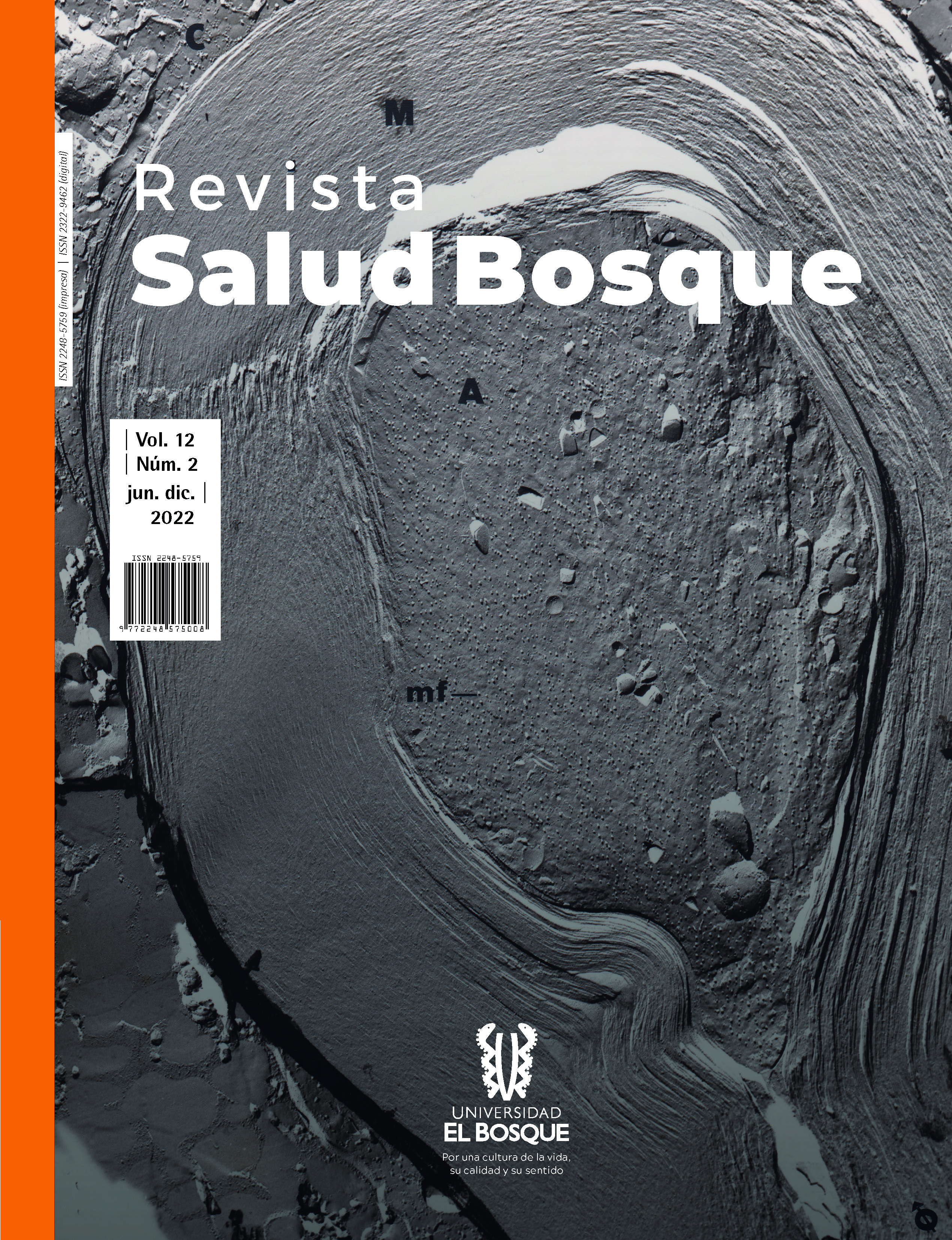La Educación médica y el bienestar
aportes de la experiencia artística
DOI:
https://doi.org/10.18270/rsb.v12i2.4132Palabras clave:
educacio medica, bienestar, estudiantes de medicina, autocuidado, artes creativasResumen
La educación médica promueve el análisis de los procesos de salud y enfermedad que afectan a individuos y poblaciones. Actualmente, existe una preocupación debido a la alta exigencia de los contextos, el estrés y el agotamiento perjudican la salud de profesionales y estudiantes de medicina e influyen de manera negativa en la atención de pacientes. Se sugiere analizar estrategias como las prácticas artísticas para promover el autocuidado, en contextos orientados al bienestar.
Descargas
Referencias bibliográficas
Frenk J, Chen L, Bhutta ZA, Cohen J, Crisp N, Evans T, et al. Profesionales de la salud para el nuevo siglo. Educ Medica. 2015; 2015;16(1):9–16. DOI: 10.1016/j.edumed.2015.04.011
Castro-Rebolledo R. Evaluación de competencias clínicas en los contextos médicos curriculares actuales. Rev. Salud. Bosque. 2018;8(1):64-8. DOI: http://dx.doi.org/10.18270/rsb.v8i1.2375
Van der Veken J, Valcke M, De Maeseneer J, Derese A. Impact of the transition from a conventional to an integrated contextual medical curriculum on students’ learning patterns: a longitudinal study. Med Teach. 2009;31(5):433-41.
DOI: 10.1080/01421590802141159.
Berger L, Waidyaratne-Wijeratne N. Where does resiliency fit into the residency training experience: a framework for understanding the relationship between wellness, burnout, and resiliency during residency training. Can Med Educ J. 2019;10(1): e20-e27.
Cheung EO, Kwok I, Ludwig AB, Burton W, Wang X, Basti N, Addington EL, Maletich C, Moskowitz JT. Development of a positive psychology program (LAVENDER) for preserving medical student well-being: a single-arm pilot study. Glob Adv Health Med. 2021; 10:2164956120988481. DOI: 10.1177/2164956120988481.
Marchalik D. Physician burnout in the modern era. Lancet. 2019;393(10174):868-9. DOI: 10.1016/S0140-6736(19)30399-X.
Seo C, Corrado M, Fournier K, Bailey T, Haykal KA. Addressing the physician burnout epidemic with resilience curricula in medical education: a systematic review. BMC Med Educ. 2021;21(1):80. DOI: 10.1186/s12909-021-02495-0.
Yuguero-Torres O. Estudio de la empatía y burnout de los médicos y enfermeras de Atención Primaria de la Región Sanitaria de Lleida y su relación con las variables clínicas [tesis doctoral. Lleida-España: Facultat de medicina- Universitat de Lleida; 2015.
Patel S, Pelletier-Bui A, Smith S, Roberts MB, Kilgannon H, Trzeciak S, Roberts BW. Curricula for empathy and compassion training in medical education: A systematic review. PLoS One. 2019; 14(8): e0221412.
DOI: 10.1371/journal.pone.0221412.10.
Weingartner LA, Sawning S, Shaw MA, Klein JB. Compassion cultivation training promotes medical student wellness and enhanced clinical care. BMC Med Educ. 2019; 19(1):139. DOI: 10.1186/s12909-019-1546-6.
Ayala EE, Omorodion AM, Nmecha D, Winseman JS, Mason HRC. What do medical students do for self-care? a student-centered approach to well-being. Teach Learn Med. 2017; 29(3):237-46. DOI: 10.1080/10401334.2016.1271334.
Ayala EE, Winseman JS, Johnsen RD, Mason HRC. U.S. medical students who engage in self-care report less stress and higher quality of life. BMC Med Educ. 2018;18(1):189. DOI: 10.1186/s12909-018-1296-x.
Boydell K, Gladstone BM, Volpe T, Allemang B, Stasiulis E. The production and dissemination of knowledge: a scoping review of arts-based health research. FQS. 2012;13(1). DOI: https://doi.org/10.17169/fqs-13.1.1711
Bungay H, Clift S. Arts on prescription: a review of practice in the U.K. Perspect Public Health. 2010;130(6):277-81.
DOI: 10.1177/1757913910384050.
Stickley T, Hui A. Social prescribing through arts on prescription in a U.K. city: participants’ perspectives
(part 1). Public Health. 2012;126(7):574-9. DOI: 10.1016/j.puhe.2012.04.002.
Osman M, Eacott B, Willson S. Arts-based interventions in healthcare education. Med Humanit. 2018; 44(1):28-33.
DOI: 10.1136/medhum-2017-011233.
Kumagai AK. A conceptual framework for the use of illness narratives in medical education. Acad
Med. 2008;83(7):653–8. DOI: 10.1097/ACM.0b013e3181782e17
Shapiro D, Tomasa L, Koff NA. Patients as teachers, medical students as filmmakers: the video
slam, a pilot study. Acad Med. 2009; 84(9):1235-43. DOI: 10.1097/ACM.0b013e3181b18896.
Jones EK, Kittendorf AL, Kumagai AK. Creative art and medical student development: a qualitative study. Med Educ. 2017; 51(2):174-83. DOI: 10.1111/medu.13140.
Shapiro J. Literature and the arts in medical education. Fam Med. 2000; 32(3):157–8.
Guilera T. Empatía y arte en estudiantes de medicina. FEM (Ed. impresa). 2018;21(4):209–13.
DOI: https://dx.doi.org/10.33588/fem.214.959.
Dhurandhar A. Writing the other: an exercise in empathy. Learn. Art. 2009;5(1):13.
DOI: https://doi.org/10.21977/D95110039
de la Croix A, Rose C, Wildig E, Willson S. Arts-based learning in medical education: the students’ perspective. Med Educ. 2011; 45(11):1090-100. DOI: 10.1111/j.1365-2923.2011.04060.x
Reilly MJ, Trial J, Piver DE, Schaff PB. Using theater to increase empathy training in medical students.
Learn. Art. 2012; 8 (1). DOI 10.21977/D9812646
van Ark AE, Wijnen-Meijer M. “Doctor Jazz”: Lessons that medical professionals can learn from jazz musicians. Med Teach. 2019; 41(2):201-6. DOI: 10.1080/0142159X.2018.1461205.
Lake J, Jackson L, Hardman C. A fresh perspective on medical education: the lens of the arts. Med
Educ. 2015;49(8):759-72. DOI: 10.1111/medu.12768.
Haidet P, Jarecke J, Adams NE, Stuckey HL, Green MJ, Shapiro D, Teal CR, Wolpaw DR. A guiding framework to maximise the power of the arts in medical education: a systematic review and metasynthesis. Med Educ. 2016; 50(3):320-31.
DOI: 10.1111/medu.1292.
Horwitz N, Bascuñan L, Schiatinno R, Acuña J, Jimenez JP. Validación de una escala para medir el bienestar subjetivo de los médicos (BISUMED). Rev Med Chil. 2010; 138(9):1084–90. DOI: http://dx.doi.org/10.4067/S0034-98872010000900002
Adler A. Teaching well-being increases academic performance: evidence from Bhutan, Mexico, and Peru [Dissertation]. Philadelphia, PA: University of Pennsylvania, 2016.
Descargas
Publicado
Cómo citar
Número
Sección
Licencia
Derechos de autor 2023 Universidad El Bosque

Esta obra está bajo una licencia internacional Creative Commons Atribución-NoComercial 4.0.
El (Los) autor(es) certifican que es(son) el (los) autor(es) originario(s) del trabajo que se esta presentando para posible publicación en la Revista Salud Bosque de la Facultad Escuela Colombiana de Medicina de la Universidad El Bosque, puesto que sus contenidos son producto de su directa contribución intelectual.
Todos los datos y las referencias a materiales ya publicados deben estar debidamente identificados con su respectivo crédito e incluidos en las notas bibliográficas y en las citas que se destacan como tal y, en los casos que así lo requieran, deben contar con las debidas autorizaciones de quienes poseen los derechos patrimoniales.
El (Los) autor(es) declara(n) que todos los materiales que se presentan están totalmente libres de derecho de autor y, por lo tanto, se hace(n) responsable(s) de cualquier litigio o reclamación relacionada con derechos de propiedad intelectual, exonerando de responsabilidad a la Universidad El Bosque











